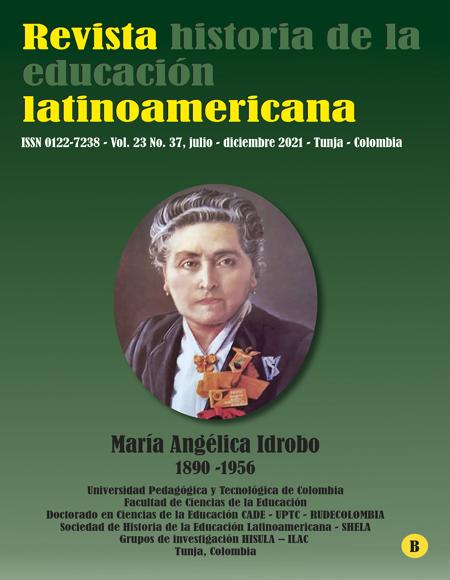The The silence of the letters: Slavery, education and freedom in Rio de Janeiro (Brazil, 19th century)

Abstract
Objective: The goal of this paper is deciphering the “silence of letters” and to understand the meanings of enslaved and freed people’s education and instruction in Imperial Rio de Janeiro.
Originality/contribution: The article suggests reading and learning about other historical experiences with the intent of questioning the widespread understanding that African enslaved people weren’t educated.
Method: Based on a comparative method and analysis of sources, the article seeks to understanding the existence of subjects made invisible in academic production: literate and educated enslaved women and men. Through the movement of connections, it is essential to map out the debate around the instruction and education of enslaved people in academic studies of the African diaspora in the Americas.
Strategies/information collection: Does studying other African diaspora experiences help understanding Brazil?
Conclusions: The article conclusion is that the meaning of education and literacy for enslaved people in the Americas allows for a more complex understanding of the Brazilian case, with particular attention given to the city of Rio de Janeiro in the 19th Century.
Keywords
diaspora, slavery, Rio de Janeiro, literacy
Author Biography
Alexandra Lima Da Silva
Doctora en Educación, docente de la Universidade do Estado do Rio de Janeiro (Brasil), correo electrónico: alexandralima1075@@gmail.com
References
- Anderson, James. The education of Blacks in the South, 1860-1935. Chapel Hill: University of North Carolina Press, 1988.
- https://doi.org/10.5149/uncp/9780807842218 DOI: https://doi.org/10.5149/uncp/9780807842218
- Andrews, Charles. The history of the New York African free schools. New York: Negro Universities Press, 1969.
- Anderson, James. O Estado da Arte da Pesquisa em História da Educação da População Negra no Brasil. 1. ed. Vitória/ES: SBHE/Virtual Livros, 2015.
- Anderson, James & Fonseca, Marcus. A História da Educação dos Negros no Brasil. Niterói: EdUFF, 2016.
- Castillo Gómez, Antonio. Historia de la cultura escrita: ideas para el debate. In.: Revista Brasileira de História da Educação, nº 5. Jan./jun. 2003. p. 93-124
- Cornelius, Janet. "When I Can Read My Title Clear": Literacy, Slavery, and Religion in the Antebellum South. Columbia: University of South Carolina Press. 1991.
- Cornelius, Janet. "'We Slipped and Learned to Read': Slave Accounts of the Literacy Process," Phylon 44 (1983), 171-86
- https://doi.org/10.2307/274930 DOI: https://doi.org/10.2307/274930
- DuBois, William Edward Burghardt. Black Reconstruction in America. New York: Harcourt, Brace and Company, 1935.
- Dunkley, Daive. Agency of the Enslaved: Jamaica and the Culture of Freedom in the Atlantic World. Lanham MD: Lexington Books, 2013.
- Fouchard, Jean. Les marrons du syllabaire; quelques aspects du problème de l'instruction et de l'éducation des esclaves et affranchis de Saint-Domingue. Port-au-Prince: H Deschamps, 1988.
- Gordon, Shirley. "The Negro Education Grant 1835-1845: Its Application in Jamaica".
- Educational Studies, Vol. 6, No. 2 (May, 1958), pp. 140-150. Published by: Taylor & Francis, Ltd. on behalf of the Society for Educational Studies. Table URL: https://www.jstor.org/stable/3118536 Accessed: 20-04-2019 01:08 UTC
- https://doi.org/10.1080/00071005.1958.9972999 DOI: https://doi.org/10.1080/00071005.1958.9972999
- Gordon, Shirley. "Schools of the free". In: Moore, Brian and Wilmot, Swithin. Before & After 1865. Education, polictis and regionalism in the Caribbean. IRP: Kingston, 1998, pp. 1-12.
- Gordon, Shirley. A century of West Indian education. London, Longmans, 1963.
- Gomez, Michael. Reversing sail: a history of the African Diaspora. Cambridge University Press, 2005.
- https://doi.org/10.1017/CBO9780511814648 DOI: https://doi.org/10.1017/CBO9780511814648
- Graham, Sandra. "Writing from the Margins: Brazilian Slaves and Written Culture", Comparative Studies in Society and History, v. 49, n. 3, pp. 611-36, 2007.
- https://doi.org/10.1017/S0010417507000643 DOI: https://doi.org/10.1017/S0010417507000643
- Hager, Christopher. Word by Word: Emancipation and the Act of Writing. Cambridge, MA: Harvard University Press, 2013.
- https://doi.org/10.4159/harvard.9780674067486 DOI: https://doi.org/10.4159/harvard.9780674067486
- Martín, José Ramón Jouve. Esclavos de la ciudad letrada: Esclavitud, escritura y colonialismo en Lima (1650-1700). Lima: Instituto de Estudios Peruanos, 2005.
- Monaghan, E. Jenifer. Reading for the enslaved, writing for the free: refletions on liberty and literacy. Worcester: American Antiquarian Society, 2000.
- Monaghan, E. Jenifer. Learning to read and write in Colonial America. University of Massachusetts Press, 2007.
- Oliveira, Klebson. Negros e escrita no Brasil do século XIX: sócio-história, edição filológica de documentos e estudo linguístico. Tese, UFBA, 2006.
- Romão, Jeruse. História da educação do negro e outras histórias. Brasília: SECAD, 2005.
- Rodriguez, Gloria. Voices of the Enslaved in Nineteenth-Century Cuba. University of North Carolina Press, 2011.
- https://doi.org/10.5149/9780807877678_garcia_rodriguez DOI: https://doi.org/10.5149/9780807877678_garcia_rodriguez
- Romney, Abraham. "Rhetoric from the Margins: Juan Francisco Manzano's Autobiografía de un esclavo". Rhetoric Society Quartely. Vol. 45, 2015, pp. 237-249.
- https://doi.org/10.1080/02773945.2015.1032855 DOI: https://doi.org/10.1080/02773945.2015.1032855
- Sosa, Enrique & Félix, Alejandrina Penabal. Historia de la educación en Cuba. La Habana: Editorial Pueblo y Educación, 2001.
- Silva, Alexandra Lima da. Entre memórias e experiências: ensino e mercado editorial de livros didáticos de História do Brasil - Rio de Janeiro (1870-1924). São Paulo: Verona, 2015.
- Schwarcz, Lilia; Gomes, Flávio. Dicionário de escravidão e liberdade. São Paulo: Companhia das Letras, 2018.
- Sosa, Enrique; Félix, Alejandrina. Historia de la educación en Cuba. Editorial Pueblo y Educación, 2001.
- Wissenbach, Maria. "Letramento e escolas". In: SCHWARCZ, Lilia; GOMES, Flávio. Dicionário de escravidão e liberdade. São Paulo: Companhia das Letras, 2018.
- Woodson, Carter. The education of the Negro prior to 1861. New York: Putnam's, 1915.
